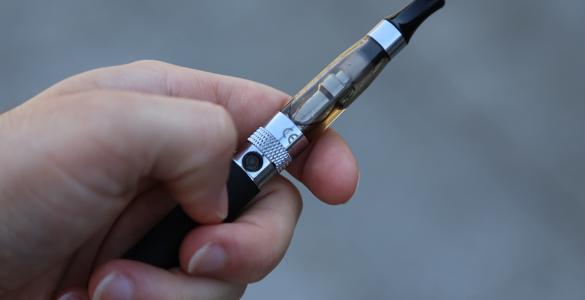Despite it being illegal to sell vapes to anyone under the age of 18, youth vaping in Wales has tripled in recent years. Bright packaging, fruity flavours, and targeted social media ads are making vapes increasingly appealing – and normalised – among young people.
This article examines the risks of youth vaping and explores how the Tobacco and Vapes Bill aims to address these trends and protect future generations.
What the evidence shows: health risk of vaping
Vaping poses significant health risks for children and young people. Most vapes contain nicotine - a highly addictive substance - and a mix of toxic chemicals. The World Health Organisation (WHO) warns vaping is unsafe for adolescents, with nicotine potentially impairing brain development and increasing the risk of learning and anxiety disorders. Vape aerosols can contain harmful substances like formaldehyde, acetaldehyde, heavy metals, and flavouring agents linked to lung and heart issues.
The NHS also highlights that young people’s developing brains and lungs are especially vulnerable. Vaping can lead to addiction, mood changes, and difficulty concentrating. It warns that young people who vape may experience respiratory symptoms, such as wheezing, chest pain, and chronic cough.
Gateway to smoking
Vaping is increasingly recognised as a gateway to smoking. Data on the use of vapes in Great Britain published by the campaign group ASH suggests around one-third of teenagers who vape eventually take up smoking. They say many young vapers have never smoked tobacco, indicating that vaping is becoming a new entry point to nicotine use rather than a cessation aid. The use of illegal or unregulated vape products further compounds the health risks.
Youth vaping trends in Wales
Survey data from the School Health Research Network shows a sharp rise in youth vaping. In 2023, 15.9% of Year 11 students in Wales reported vaping at least weekly, and nearly half (45.4%) had tried it. Regular vaping was more common among girls (8.6%) than boys (5.1%), and many had never smoked.
Harm reduction messaging: a delicate balance
Public Health Wales acknowledges that vaping is less harmful than smoking, it is not risk free, especially for young people. While vaping avoids the combustion that produces tar and carbon monoxide, the “less harmful” message can be misinterpreted by teenagers as “harmless.”
Public Health Wales emphasises that non-smokers, particularly young people, should not vape at all. It says “Evidence regarding the health effects resulting from the use of vaping devices is very limited. However, vaping does put young people at risk of nicotine addiction, a dependency that impacts their education, behaviour and their daily life”.
To address this, public health campaigns are adapting their messaging:
- For adult smokers: Vaping may help you quit smoking and is less harmful than continuing to smoke.
- For young people and non-smokers: Vaping is not safe. It can harm your brain, lungs, and lead to addiction—even if it’s less harmful than smoking.
Vaping measures in the Tobacco and Vapes Bill
The Tobacco and Vapes Bill is UK-wide and supported by the Welsh Government. Its most high-profile measure is the age-based tobacco ban, ensuring that anyone born on or after 1 January 2009 will never be legally sold tobacco (see our previous article for details).
The Bill proposes a range of measures aimed at reducing the appeal, accessibility, and visibility of vapes to under-18s. These include:
- Restrictions on advertising, flavours, packaging, and vending machines to limit the appeal to young people.
- Creation of vape-free zones, similar to smoke-free areas, to reduce exposure and normalisation in public spaces.
- Powers for Trading Standards Wales to enforce regulations, including issuing fixed penalty notices.
- A retailer licensing system covering both tobacco and vape products.
- Limits on how and where vapes can be promoted, including online and in-store visibility.
- On-the-spot fines for sales to under-18s, strengthening enforcement.
Separately, a ban on disposable vapes in Wales was introduced on 1 June 2025, to address both environmental and health concerns.
Scrutiny in the Senedd
The Senedd’s Health and Social Care Committee reviewed two Legislative Consent Memoranda (LCMs) on the Bill and supported the Senedd granting consent. It made a number of specific recommendations:
- Clearer messaging for young people: the Committee asked the Welsh Government (working with Public Health Wales) to provide clearer guidance for children and young people about the long-term risks of vaping and nicotine addiction, echoing the evidence that young people should avoid vaping altogether.
- Support for young people: it urged the Welsh Government to ensure that support services are available for young people already addicted to nicotine.
- Enforcement: the Committee requested the Welsh Government assess the enforcement mechanisms accompanying the Bill, to confirm they are adequate for vaping regulation, and to report back on its findings.
- Clarification of delegated powers: it asked the Welsh Government to clarify whether the delegated powers in Clause 92, which govern vape content and flavours, apply only to the UK Secretary of State, or whether Welsh Ministers also have authority under the Bill. Welsh Ministers must be consulted on matters within devolved competence, but do not hold direct powers to regulate flavours.
Banning vapes outright
Both the UK and Welsh Governments recognise that vaping can help adult smokers quit. Professor Chris Whitty, as the former UK Chief Medical Officer called marketing vapes to children and young people “utterly unacceptable” and endorsed the Bill as a vital step toward a smoke and vape-free generation.
Rather than banning vapes outright, the UK Government says it is pursuing a balanced approach - “vapes, when combined with behavioural support, can help adult smokers to quit, but children and adults who have never smoked should never vape“.
It is also funding a £62 million, 10-year research programme to investigate the long-term health impacts of vaping on children and adolescents.
Looking ahead
Wales’ Health Secretary, Jeremy Miles MS, has said the Bill “has the potential to radically transform our relationship with smoking by creating the first truly smoke-free generation”.
However, the ongoing uncertainty about the full impact of vaping—particularly on young people and adults who have never smoked—combined with the continued availability of flavoured vape products and the growing normalisation of vaping among teenagers, suggests that further preventative measures may be necessary. As Wales moves toward a smoke-free generation, the challenge remains: should Ministers now also consider whether we should be working towards a vape-free Wales?
Article by Sarah Hatherley, Senedd Research, Welsh Parliament.






